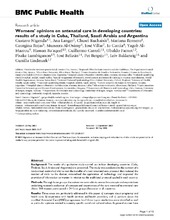Womens' opinions on antenatal care in developing countries: results of a study in Cuba, Thailand, Saudi Arabia and Argentina
Nigenda, Gustavo; Langer, Ana; Kuchaisit, Chusri; Romero, Mariana; Rojas, Georgina; Al-Osimy, Muneera; Villar, José; Garcia, Jo; Al-Mazrou, Yagob; Ba'aqeel, Hassan; Carroli, Guillermo; Farnot, Ubaldo; Lumbiganon, Pisake; Belizán, José; Bergsjø, Per; Bakketeig, Leiv; Lindmark, Gunilla
Peer reviewed, Journal article
Published version
Permanent lenke
https://hdl.handle.net/1956/8377Utgivelsesdato
2003-05-20Metadata
Vis full innførselSamlinger
Originalversjon
https://doi.org/10.1186/1471-2458-3-17Sammendrag
Background: The results of a qualitative study carried out in four developing countries (Cuba, Thailand, Saudi Arabia and Argentina) are presented. The study was conducted in the context of a randomised controlled trial to test the benefits of a new antenatal care protocol that reduced the number of visits to the doctor, rationalised the application of technology, and improved the provision of information to women in relation to the traditional protocol applied in each country. Methods: Through focus groups discussions we were able to assess the concepts and expectations underlying women's evaluation of concepts and experiences of the care received in antenatal care clinics. 164 women participated in 24 focus groups discussion in all countries. Results: Three areas are particularly addressed in this paper: a) concepts about pregnancy and health care, b) experience with health services and health providers, and c) opinions about the modified Antenatal Care (ANC) programme. In all three topics similarities were identified as well as particular opinions related to country specific social and cultural values. In general women have a positive view of the new ANC protocol, particularly regarding the information they receive. However, controversial issues emerged such as the reduction in the number of visits, particularly in Cuba where women are used to have 18 ANC visits in one pregnancy period. Conclusion: Recommendations to improve ANC services performance are being proposed. Any country interested in the application of a new ANC protocol should regard the opinion and acceptability of women towards changes.
Utgiver
BioMed CentralTidsskrift
BMC Public HealthOpphavsrett
Copyright 2003 Nigenda et al; licensee BioMed Central Ltd. This is an Open Access article: verbatim copying and redistribution of this article are permitted in all media for any purpose, provided this notice is preserved along with the article's original URL.Gustavo Nigenda et al.; licensee BioMed Central Ltd.
